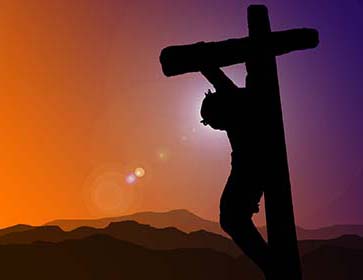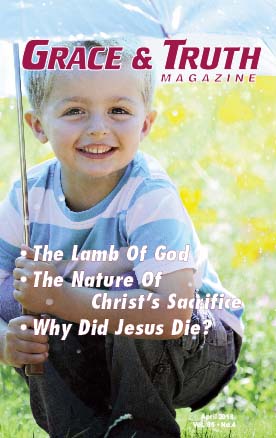The Offerings Of Numbers 28-29
 By L. M. Grant (adapted)
By L. M. Grant (adapted)
Daily Offerings (Numbers 28:1-8)
As Israel prepared to enter the Promised Land, there were matters of serious importance raised by the Lord. Their recognition of God’s rights was to come first. He spoke therefore of “My offering, My food for My offerings made by fire as a sweet aroma to Me … at their appointed time” (v.2 NKJV). Jacob, in going out from Beersheba, expected God to give him food to eat (Gen. 28:20), but he forgot that he ought to give God food to eat. Likewise, we often think of our rights and forget God’s rights. May we think more deeply of giving God some true refreshment, for He is ignored by most people today. God has created us in such a way that we appreciate food. Therefore, is it not fully understandable to us that God should desire food from us?
The offerings that Israel was to consider as God’s food are detailed for us in Numbers 28-29. Every day two young lambs were to be offered, one in the morning and one in the evening (vv.3-4). These were burnt offerings, emphasizing the honor that is to be wholly given to God because of the value of the sacrifice of the Lord Jesus. With them, one tenth of an ephah1 of fine flour was included as a grain offering, mixed with one fourth of a hin2 of pressed oil (v.5). This grain offering speaks of the perfection of the humanity of the Lord Jesus expressed in all His life on earth, energized by the Spirit of God, as pictured in the oil. As we keep Him in affectionate memory before God, we are truly offering the grain offering. Verse 6 speaks of this in total as one offering of a sweet aroma, for there is perfect unity in the sacrifice of Christ.
Offerings On The Sabbath (Numbers 28:9-10)
On the Sabbath days there were two lambs added to the daily offering, with both grain offerings and drink offerings as in the daily offerings. The Sabbath speaks of the eternal rest of God, and in that day our appreciation of the sacrifice of Christ will not diminish, but increase.
Monthly Offerings (Numbers 28:11-15)
There would be no lack of work to keep the priests occupied. At each month’s beginning a special burnt offering was to be made “to the LORD: two young bulls, one ram, and seven lambs in their first year, without blemish” (v.11). With this was included three tenths of an ephah of fine flour mixed with oil for each bull, two tenths of the same for the ram and one tenth for each lamb. The total of this was called “a burnt offering of sweet aroma, an offering made by fire to the LORD” (v.13). Thus, special occasions called for special observance by Israel, and a drink offering of varying proportions for each animal was added.
But every month a kid of the goats was also to be sacrificed as a sin offering (v.15). This was not a trespass offering, for the trespass offering was for specific cases of trespass, while the sin offering applied to the root principle of sin as being hateful to God. Therefore, it was a reminder that the scourge of sin was present in every Israelite, as it is in us, and only by the sacrifice of Christ is it properly judged.
Offerings At The Feast Of The Passover (Numbers 28:16-25)
The Passover was to be kept yearly, on the 14th day of the first month. It was attended by the Feast of Unleavened Bread, which was kept from the 15th day for seven days. The two feasts are often viewed as one and called “the Feast of the Passover” (Ex. 34:25; Lk. 2:41; Jn. 13:1). Unleavened bread was to be eaten seven days, for the Passover speaks both of sins forgiven by the blood of the sacrifice and of sin condemned by the death of Christ. Leaven is a symbol of sin, and the seven days speak of its complete judgment by the death of the Lord Jesus.
There was to be a holy convocation, or calling together, on the first day. It was a gathering of the people to give honor to the LORD; no work was to be done for they were celebrating God’s work (Num. 28:17-18). A burnt offering was to be presented consisting of two young bulls, one ram and seven lambs in their first year. All being typical of Christ, they were to be carefully inspected to see that they had no blemish. The young bulls speak of the strength of the offering of Christ; the ram speaks of His devotion to God, and the lambs picture His lowly obedience in submission to the will of His Father.
The burnt offering was to be accompanied by a grain offering of fine flour mixed with oil: three tenths of an ephah for each bull, two tenths for the ram and one tenth for each of the seven lambs (vv.20-21). The grain offering again speaks of the person of the Lord Jesus in lowly humanity, and being mixed with oil implies that the Spirit of God permeated His every action from birth.
Added to these there was to be offered one goat as a sin offering (v.22). The goat was regarded as a substitute for the people, with its reminder again of the sin that dwelt within the people that must be judged by virtue of the sacrifice of Christ, our Substitute.
Verse 24 indicates that the food of the offering was to be offered each day for the seven days, as a sweet aroma to the LORD. It does not seem that the sin offering was included for the six days following the first, for the sin offering is not “a sweet aroma” as was the burnt offering. The seventh day called also for a holy convocation (v.25), with no work being done.
Offerings Of The Feast Of Weeks (Numbers 28:26-31)
The Feast of Weeks was 50 days – seven weeks – after the Passover, when a new grain offering was to be brought as the firstfruits of Israel’s harvest. On this day was another holy convocation when no work was to be done. This pictures the birth of the Church at Pentecost (Acts 2), when the Spirit of God came to begin the forming of one body composed of both Jewish and, a little later, Gentile believers. “A new grain offering” implies that the Lord Jesus is seen as identified with His saints in the new dispensation of God, the Church period.
The burnt offering was to be identical to that offered on Passover: two young bulls, one ram and seven lambs in the first year. The grain offering was also the same: three tenths of an ephah of fine flour mixed with oil for each bull, two tenths for the ram and one tenth for each lamb (vv.27-28). These were for a sweet aroma to the LORD, while a kid of the goats was again offered “to make atonement” as a sin offering (v.30).
The offerings here were only offered once on the day of firstfruits (v.26), for it was not a week-long feast as was the Passover and Unleavened Bread. It is to be noted that “the Feast of Firstfruits” (Lev. 23:9-14) is distinct from “the day of the firstfruits” in Numbers 28:26. Maybe a little chart would be helpful.
The Feast of Firstfruits
(Leviticus 23:9-14) |
The Day of firstfruits
(Numbers 28:26) |
| Followed the Passover |
Was 50 days after the Passover |
Typical of the resurrection of
the Lord Jesus (1 Cor. 15:20) |
Typifies the Church and the
firstfruits of Christ’s work
of redemption |
In what the day of firstfruits typifies, the Church is identified with Him as “a kind of firstfruits” (Jas. 1:18). Does this not remind us that the birth of the Church is the result of the sacrifice of Christ? The Spirit who came at Pentecost will always keep in our memory the reality of which the Passover speaks – the one great sacrifice of the Lord Jesus.
Again it is insisted the offerings must be without blemish (v.31). The perfection of purity in the Lord Jesus must never be compromised.
Offerings At The Feast Of Trumpets (Numbers 29:1-6)
About four months passed before the Feast of Trumpets took place. This illustrates the long time elapsing following Pentecost, which introduced the extended dispensation of the grace of God while Israel has remained in a state of unbelief.
The Feast of Trumpets itself symbolizes the regathering of Israel to their land, as noted in Matthew 24:31: “And He will send His angels with a great sound of a trumpet, and they will gather together His elect from the four winds, from one end of heaven to the other.” “His elect” in this verse are those elect for earthly blessing. There have already been signs of Israel’s return to their land with at least a relatively small number restored there. However, when the Church is raptured to heaven, then this call by angelic power will have great public effect, for the trumpets speak of a clearly declared testimony.
“The last trumpet” in connection with the rapture (1 Cor. 15:52) will be sounded much before the trumpet to regather Israel; but it is called “the last trumpet” because it will be the last public testimony on earth as to the Church of God. Her being suddenly taken away will be a most striking testimony. But as regards Israel, there are other trumpets following this great event.
On the day of blowing of trumpets, there was to be a burnt offering of one young bull, one ram and seven lambs in their first year, all unblemished. At Pentecost two young bulls were offered, otherwise the offerings were the same, and the grain offering was the same for each animal. A kid of the goats was again included as a sin offering, “to make atonement” rather than “as a sweet aroma.” These were all added to the regular monthly offerings, as Numbers 29:6 indicates.
Offerings On The Day Of Atonement (Numbers 29:7-11)
The Day of Atonement closely followed the Feast of Trumpets. Only ten days later, it symbolizes the great work of God in Israel when, at the end of the tribulation, “they look upon Him whom they pierced” (Zech. 12:10), and they will be broken down in profound repentance and faith in the Lord Jesus. This is why Israel is told, “You shall afflict your souls,” when they gathered in holy convocation, ceasing from any work (Num. 29:7).
A burnt offering was to be presented: one young bull, one ram and seven lambs in their first year, without blemish. One kid of the goats was offered as a sin offering as well as the grain offering (v.11). These were in addition to the main offerings of the Day of Atonement.
The offerings made on the Day of Atonement as presented in Numbers 29:7-11 are described in more detail in Leviticus 16. There, Aaron was to take the blood of the sin offering into the holiest of all, and the bodies of the animals were burned without the camp. There is much benefit in prayerful comparison of the two passages.
But on that day, though the main focus was on the once yearly sin offering, the burnt offering was not to be forgotten, for in every connection God is to be glorified. This is just as true in His great work of judging sin as in the blessing of sinners.
Offerings At The Feast Of Tabernacles (Numbers 29:12-40)
The Feast of Tabernacles symbolizes the great blessing of God in the millennial age. Hence, there is much more in the way of offerings prescribed for this feast, which was kept up for eight days.
The feast began only five days after the Day of Atonement, for after Israel has been broken down in true repentance before God, God cannot delay to fill their hearts with overflowing adoration of His beloved Son. The first day was to be a holy convocation. On this day the number of rams and lambs was doubled above the other feast days and the number of bulls was to be thirteen. The number thirteen falls short of 2×7 – the witness (2) of perfection (7). The reason for falling short is that the millennium is not eternity; the people of God will still have their sinful natures as well as the new nature. The tendency of this is toward decline, just as Ephesus left her first love (Rev. 2:4) and the decline of the Church has continued through her history on earth.
On the eighth day there was to be a solemn assembly with all work ceasing (Num. 29:35), a good reminder that the great blessing of the millennium is not dependent on Israel’s work, but it is altogether on the grace of God. The number 8 in Scripture speaks of a new beginning, and the millennium will indeed be a new beginning for Israel, for their joy will be overflowing in contrast to the centuries of sorrow and trouble they have seen. The offerings made every day for the eight days indicate that Israel will not cease to give honor and praise to God during that period of 1,000 years. The offerings on the eighth day (vv.36-39) were the same as on the day of the Feast of Trumpets and on the Day of Atonement.
Throughout these offerings we repeatedly see points presented as to our Lord Jesus Christ and His work. Let us be careful to give Him the first place in our lives, honoring Him in all we do and say. To Him be the glory!
ENDNOTES
1. As a dry measure, it was short of 6.5 gallons (Concise Bible Dictionary).
2. A liquid measure of just over one gallon (Concise Bible Dictionary).
| Numbers 28-29 tell of Jehovah’s portion which He is to receive in the worship of His people. Needless to say, all speaks of Christ. In Christ, God has found His delight. In Leviticus there is that aspect of the different offerings by which God has met our need in Christ and His blessed work; but here Jehovah speaks of these offerings as being “My bread” (Num. 28:2). The heart of God feeds, humanly speaking, upon Christ.
—Arno C. Gaebelein, adapted.
|
 By Paul Alberts
By Paul Alberts “For God so loved the world that He gave His only begotten Son, that whoever believes in Him should not perish but have everlasting life.” —John 3:16
“For God so loved the world that He gave His only begotten Son, that whoever believes in Him should not perish but have everlasting life.” —John 3:16  Answered by Eugene P. Vedder, Jr.
Answered by Eugene P. Vedder, Jr.




 By L. M. Grant (adapted)
By L. M. Grant (adapted)